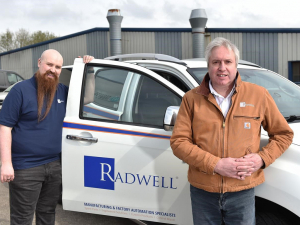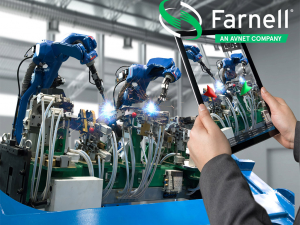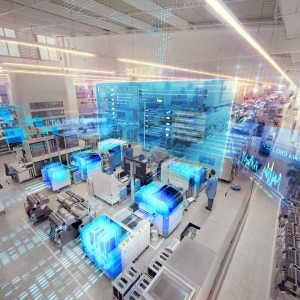Virtual Engineer To Predict Machine Failure
9th November 2010
Source:
University of Portsmouth
Scientists at the University of Portsmouth have created a 'virtual engineer' which uses artificial intelligence techniques to predict when machines need repairing.
The system is expected to overturn the primitive concept of waiting for a machine to fail before calling an engineer. Instead it calculates when a part is wearing out allowing the company to schedule maintenance. In an era of 'twenty-four-seven' production lines with machines running around the clock, it could revolutionise the way industry manages machine failure and repair.
The new system works by placing sensors on vulnerable parts of the machine, such as the bearings, while predictive software monitors and analyses performance, alerting technicians when it detects that a part is not working properly or needs replacing.
Dr David Brown, Head of the University's Institute of Industrial Research (IIR), said:
The machines in many processing plants and factories are running day and night and an unscheduled stoppage can cause havoc and can result in huge costs. This new diagnostic system prevents potential mechanical failure by identifying the faulty or worn out part before it causes a problem.
It's the first time this kind of technology has been used on this scale in the processing industry. The traditional approach to machine maintenance is being blown out of the water by real time diagnostics.
The benefits are clear to Stork Food & Dairy Systems (SFDS). It is collaborating with the IIR by testing the system at some of its processing plants. The company develops and supplies processing equipment for the dairy, juice, food and pharmaceutical industries. Its customers, who include milk suppliers, run their machines twenty four hours a day and their businesses depend on mechanical reliability.
Luke Axel-Berg, General Manager at SFDS Ltd, said that system 'downtime' is the scourge of the production industry and is to be avoided at all costs.
An unplanned stoppage on a production line can be a total disaster. It can spell chaos for a processing plant, especially a dairy plant where milk is literally arriving every single day. The cows don¿t stop producing milk because a machine has broken. Instead the milk must be sent to an alternative location putting unexpected pressure on another plant.
In the event of a major breakdown lasting several days we could even risk losing a customer - how do you put a price on that?
Planned downtime, on the other hand, he said, is less disruptive because they can build supply and delivery around it and arrange in advance for other plants to take over production. It's an entirely new way of looking at downtime.
Dr Brown of the IIR says that the really clever part is that the system is adaptive.
During the process of monitoring the machine, the software literally learns more about how it works, which parts are becoming worn and anything else that could potentially cause mechanical failure.
This is important when the machines are custom built to a high specification and the characteristic details of each one is unique. The IIR's diagnostic system can learn the particular behaviour of each individual machine.
Repairing the machines which do break down remains the remit of an engineer, but the diagnostic software can direct the engineer to a specific fault which might otherwise have taken days to identify.
Human beings are highly intelligent and a good engineer might sometimes spot if something is about to break but this system will help speed up the time it takes to fix, Dr Brown said.
Dr Brown predicts significant costs savings to industry, because keeping a specialist engineer on call around the clock is very expensive. The entire process becomes very much easier if the company knows when to schedule machine repairs and maintenance in advance.
Stork's Axel berg said: Our customers are already calling for a 'zero-fault' level on their machines. Until now it's been impossible to guarantee that level of customer service but this new diagnostic system looks set to change all that by taking away the risk.
It will benefit any business which relies on machines to keep its operation turning over, especially if they want to minimise costs and guarantee customer satisfaction.
Stork Food & Dairy Systems are collaborating with the Institute of Industrial Research as part of a Knowledge Transfer Partnership (KTP), a government scheme which helps businesses address specific needs by partnering with an academic institution.
The new system works by placing sensors on vulnerable parts of the machine, such as the bearings, while predictive software monitors and analyses performance, alerting technicians when it detects that a part is not working properly or needs replacing.
Dr David Brown, Head of the University's Institute of Industrial Research (IIR), said:
The machines in many processing plants and factories are running day and night and an unscheduled stoppage can cause havoc and can result in huge costs. This new diagnostic system prevents potential mechanical failure by identifying the faulty or worn out part before it causes a problem.
It's the first time this kind of technology has been used on this scale in the processing industry. The traditional approach to machine maintenance is being blown out of the water by real time diagnostics.
The benefits are clear to Stork Food & Dairy Systems (SFDS). It is collaborating with the IIR by testing the system at some of its processing plants. The company develops and supplies processing equipment for the dairy, juice, food and pharmaceutical industries. Its customers, who include milk suppliers, run their machines twenty four hours a day and their businesses depend on mechanical reliability.
Luke Axel-Berg, General Manager at SFDS Ltd, said that system 'downtime' is the scourge of the production industry and is to be avoided at all costs.
An unplanned stoppage on a production line can be a total disaster. It can spell chaos for a processing plant, especially a dairy plant where milk is literally arriving every single day. The cows don¿t stop producing milk because a machine has broken. Instead the milk must be sent to an alternative location putting unexpected pressure on another plant.
In the event of a major breakdown lasting several days we could even risk losing a customer - how do you put a price on that?
Planned downtime, on the other hand, he said, is less disruptive because they can build supply and delivery around it and arrange in advance for other plants to take over production. It's an entirely new way of looking at downtime.
Dr Brown of the IIR says that the really clever part is that the system is adaptive.
During the process of monitoring the machine, the software literally learns more about how it works, which parts are becoming worn and anything else that could potentially cause mechanical failure.
This is important when the machines are custom built to a high specification and the characteristic details of each one is unique. The IIR's diagnostic system can learn the particular behaviour of each individual machine.
Repairing the machines which do break down remains the remit of an engineer, but the diagnostic software can direct the engineer to a specific fault which might otherwise have taken days to identify.
Human beings are highly intelligent and a good engineer might sometimes spot if something is about to break but this system will help speed up the time it takes to fix, Dr Brown said.
Dr Brown predicts significant costs savings to industry, because keeping a specialist engineer on call around the clock is very expensive. The entire process becomes very much easier if the company knows when to schedule machine repairs and maintenance in advance.
Stork's Axel berg said: Our customers are already calling for a 'zero-fault' level on their machines. Until now it's been impossible to guarantee that level of customer service but this new diagnostic system looks set to change all that by taking away the risk.
It will benefit any business which relies on machines to keep its operation turning over, especially if they want to minimise costs and guarantee customer satisfaction.
Stork Food & Dairy Systems are collaborating with the Institute of Industrial Research as part of a Knowledge Transfer Partnership (KTP), a government scheme which helps businesses address specific needs by partnering with an academic institution.
Similar articles
More from University of Portsmouth
- Virtual Engineer To Predict Machine Failure 9th November 2010












Write a comment
No comments